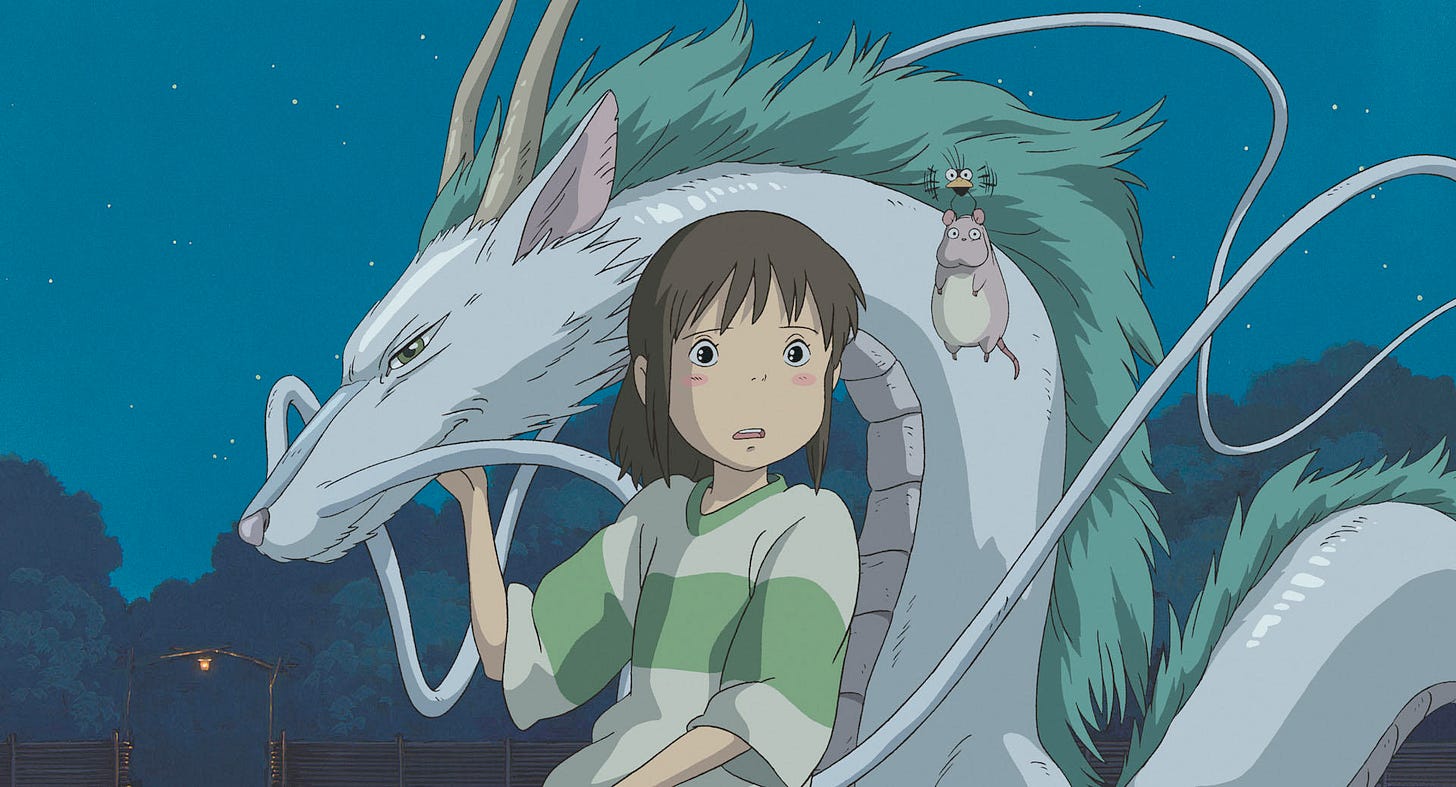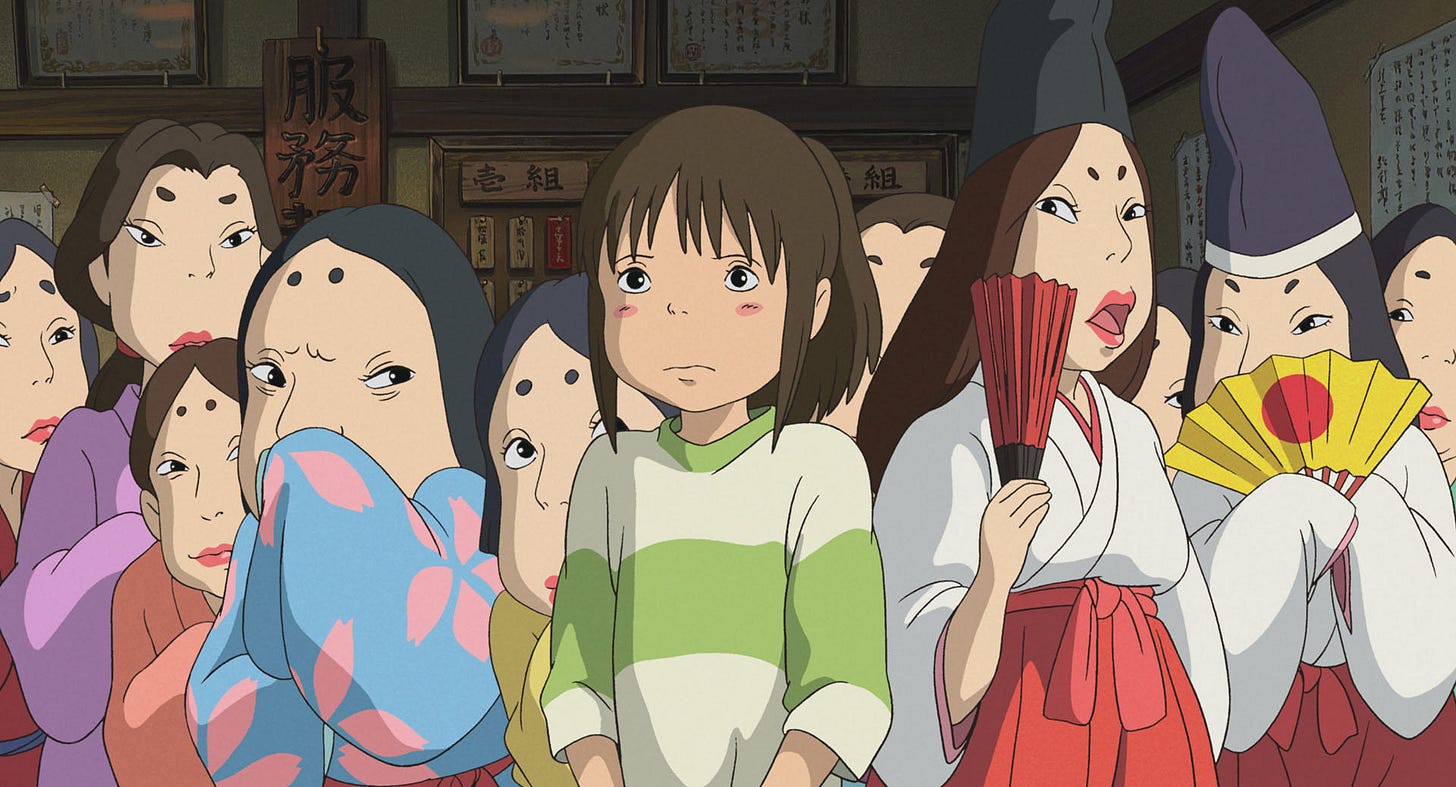The first time I watched Spirited Away, I was in tears. I was completely breathless and enamoured with its storyline and meaningful symbolism. Every character, whether part of the main cast or a side character, played a role in the film’s overarching message. I’ve rewatched it many times and I never get tired of it. The animation style and plot are well-crafted. I bought Hayao Miyazaki’s book Turning Point: 1997-2008. The book is an anthology of essays, notes, concept art and interviews. One of the films in it is Spirited Away. In an interview, Miyazaki was asked how he felt about Chihiro. He linked it to Ghibli and how coming to a new place is scary. “Joining an organisation, finding your own place, and being recognised there requires a lot of effort. In many instances, you must use your own strength. But that’s a matter of course, that’s living in the world.”
When I rewatched Spirited Away after this interview, I saw something new that had not caught my attention. From the beginning to the end, Chihiro is constantly moving on. It is not just about how she grows as a person, but also shows Chihiro moving on from different people and places. The film opens with her family moving into a new home, and Chihiro leaving her friends behind. It then shows how Chihiro had to fit in with the creatures at the Bathhouse and make new friends before she had to save her parents from being pigs and move on from the Bathhouse to go home. Finally, Chihiro has to let go and move on from Haku. Spirited Away shows the reality of growing up. We are never in the same place with the same people. We must keep going forward.
From the film’s beginning, Chihiro is forced to leave behind her old life, including her friends, and face the challenges of starting anew. This transition is not easy for Chihiro, and her reluctance to embrace change is clear in her behaviour. As she rides in the car with her parents, moving toward their new home, Chihiro sulks in the backseat, clutching a bouquet given to her by her friend, a symbol of her reluctance to let go. She expresses her sadness, “I finally get a bouquet and it’s a goodbye present.” As someone who left South Africa for New Zealand, I understand her wanting to cling to the past. Hesitation and fear are universal experiences of growing up. When we moved to New Zealand, I lost the contacts of my childhood friends. There was an uncertainty that reigned in my stomach, mind and heart about this new place. Like Chihiro, I was scared of leaving behind what I was comfortable with and stepping into the unknown.
Once Chihiro stumbles into the mysterious world of the Bathhouse, she struggles. She was initially excluded and mocked by the creatures at the Bathhouse for being human. Yubaba, the witch who runs the Bathhouse dismissively treats Chihiro when she confronts Yubaba to secure a job. Yubaba takes her name and then renames her “Sen.” This act strips Chihiro of her identity, reinforcing the idea that she is an outsider who must prove herself worthy of acceptance in the Bathhouse. When I first arrived in New Zealand, my first school attempted to silence me by bullying and ostracising me. They belittled my intellect, identity, passions and interests. Just like Yubaba, my first school here tried to force the idea on me that I must “prove” my worth to be accepted.
Similarly, just as my classmates in my first school bullied me, the spirits and creatures reacted to Chihiro with suspicion and disdain. They regarded her with scepticism. Chihiro can even hear the workers gossiping about her. I felt Chihiro’s awkwardness. It is not a nice experience to feel the scrutiny and judgement of being a new person in a new place—it all makes one feel lonely, frustrated, angry, and disappointed. In one scene, Chihiro is trying to ask for bath tokens and she is brushed aside and ignored. The way she stumbles through the crowd to get the bath tokens, unsure of herself symbolises the disorientating experience of growing up, where children are thrust into social situations without a clear understanding of the rules and dynamics at play. As she grapples with her new name, Chihiro struggles to retain her sense of self while adapting to her surroundings, like children feeling pressured to conform to new social spaces. Just like me holding onto my Nigerian and South African cultures in this land.
Despite her initial struggles, Chihiro embodies resilience. She slowly learns the ins and outs of the Bathhouse, taking on tasks that require determination and courage. We see this in the scene when she helps the Stink Spirit. Chihiro’s willingness to help shows her growing maturity and empathy. By helping, she not only fulfils her duties but also shows how this act of kindness became a turning point for her character. It showed her determination to understand and accept those around her. As Chihiro continues to navigate the Bathhouse, she gradually builds friendships. Her relationship with Lin, a fellow worker, is important. Lin is a mentor, older sister and friend of Chihiro. Lin guides her through the complicated pathways in Bathhouse life.
As the film progresses, Chihiro’s determination and kindness earn her the respect of the Bathhouse creatures. She transforms from a frightened girl into a competent worker who can contribute meaningfully to the Bathhouse. Her growing sense of belonging and identity culminates in her interactions with other characters, such as Haku, who becomes a close ally. The bond they share highlights Chihiro’s evolution; she learns to trust others and accept help, a crucial step in growing up and moving on. Just as Chihiro changed, I also went through a transformation. The scared 11-year-old girl who came to New Zealand is different from the passionate 18-year-old woman.
To save her parents from being pigs forever, Chihiro defeats Yubaba but she has to go home. Chihiro faces the inevitable truth that moving forward often requires letting go of past connections. Chihiro’s realisation of her need to move on comes into focus during her final encounters with her Bathhouse friends. The moment is bittersweet as she acknowledges the growth she has experienced alongside them. Haku, in particular, represents not just a friend but a reflection of her journey. Their bond is strong; he helps her remember her identity and encourages her, but ultimately, Chihiro must confront the reality that her time in the spirit world is ending. On my last day in South Africa, I hugged and said goodbye to my childhood best friend at school. I still wonder where she is and how she is doing. I hope she is succeeding.
Additionally, Chihiro is drenched in apprehension that she may forget her journey. This sentiment is echoed by Yubaba’s nice twin sister, Zeniba, who reminds Chihiro, “Once you meet someone, you never really forget them. It just takes a while for your memory to come back to you. Once you do something, you never forget. Even if you can’t remember.” This quote encapsulates the reassurance that while moving forward may feel daunting, the experiences and lessons learned during childhood are indelible. Chihiro’s fear of losing touch with her past, including her friendships in the Bathhouse, is something I had when moving to New Zealand. I was worried that all my memories and experiences of South Africa would erupt and vanish into thin air. Zeniba’s comforting words are a reminder that growth does not erase memories, rather it enriches them. Chihiro’s ability to carry her experiences and lessons from the Bathhouse into the future symbolises the importance of embracing change while cherishing the past. As she prepares to leave the spirit world, she acknowledges that her growth and maturity will not erase her childhood but add depth to her identity.
Finally, the last lines in the film are between Chihiro and her father as they drive away from the tunnel that led them to the spirit world and forward towards their new home. Her father remarks, “A new home and a new school? It is a bit scary.” Chihiro replies, “I think I can handle it.” This exchange shows how Chihiro has grown throughout the film. She starts as a frightened girl who is uncertain of her abilities but emerges as a resilient young woman ready to face new challenges. Chihiro’s confidence signifies a pivotal transformation; she recognises that while change is intimidating, it is also a vital part of life. By asserting that she can handle whatever comes next, she embodies the theme that moving on is essential for personal growth. The acknowledgement of fear in her father’s words highlights the shared anxiety we all face surrounding change, yet Chihiro’s response presents her newfound strength.
This moment ties back to the overarching message of Spirited Away. To continue living and evolving, we must embrace change and move on. Chihiro’s journey illustrated that while letting go can be difficult, it is also an opportunity for new experiences, places and people. By moving on, Chihiro learns to carry her memories and lessons forward, ultimately shaping her into the capable person she has become. Perhaps, we can all learn a few things from Chihiro and a little spirit world.
“It’s fun to move to a new place. It’s an adventure.” — Spirited Away








such a thoughtful analysis of such a mesmerising movie. loved reading it 💙
This is so well thought out! I was just thinking about the concept of “not being the same person in the same spot twice” but more so related to grief and how its okay to move forward those memories wont leave you. I havent watched spirited away yet but its definitely up on my list now. Thank you for writing this! 🤍